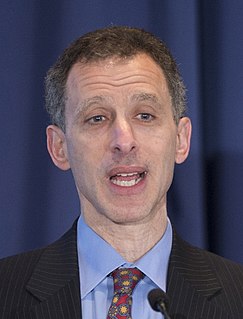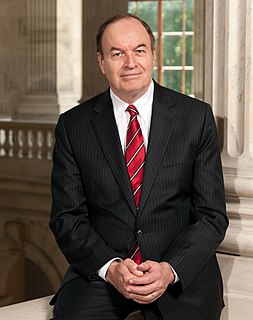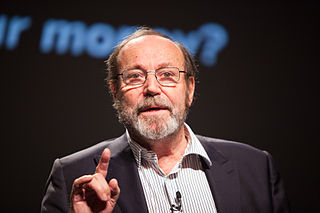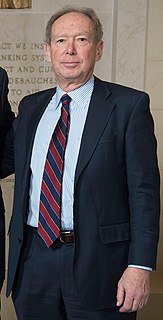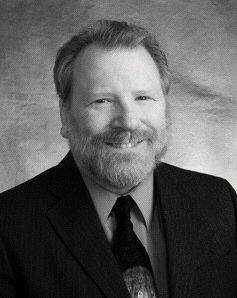A Quote by Jeremy C. Stein
Perhaps more to the point for TBTF (Too Big To Fail bank), if a SIFI (Systemically Important Financial Institution) does fail I have little doubt that private investors will in fact bear the losses-even if this leads to an outcome that is messier and more costly to society than we would ideally like. Dodd-Frank is very clear in saying that the Federal Reserve and other regulators cannot use their emergency authorities to bail out an individual failing institution
Quote Topics
Authorities
Bail
Bank
Bear
Big
Cannot
Clear
Costly
Dodd-Frank
Does
Doubt
Emergency
Even
Fact
Fail
Failing
Federal
Federal Reserve
Financial
Frank
Ideally
Important
In Fact
Individual
Institution
Investors
Leads
Like
Little
Losses
More
Other
Out
Outcome
Perhaps
Point
Private
Regulators
Reserve
Saying
Society
Than
Too
Use
Very
Will
Would
Related Quotes
It is worth noting that 'too big to fail' is not simply about size. A big institution is 'too big' when there is an expectation that government will do whatever it takes to rescue that institution from failure, thus bestowing an effective risk premium subsidy. Reforms to end 'too big to fail' must address the causes of this expectation.
Fannie Mae and Freddie Mac - two bloated and corrupt government-sponsored programs - contributed heavily to the crisis.In order to prevent another crisis, we need to do what we should have done years ago - reform Fannie Mae and Freddie Mac. We also need to repeal Dodd-Frank, the Democrats' failed solution. Under Dodd-Frank, 10 banks too big to fail have become five banks too big to fail. Thousands of community banks have gone out of business.
But the instinct of hoarding, like all other instincts, tends to become hypertrophied and perverted; and with the institution of private property comes another institution-that of plunder and brigandage. In private life, no motive of action is at present so powerful and so persistent as acquisitiveness, which unlike most other desires, knows no satiety. The average man is rich enough when he has a little more than he has got, and not till then.
There are a number of institutions globally where the Federal Reserve typically leads the U.S. effort to work with financial regulators from other countries, and we try to, to the extent possible, establish international standards for how - the amount of capital a bank should hold, for example, or how much.
Dodd-Frank greatly expanded the regulatory reach of the Federal Reserve. It did not, however, examine whether it was correctly structured to account for these new and expansive powers. Therefore, the Committee will be examining the appropriateness of the Fed's current structure in a post Dodd-Frank world.
We have a huge institution that celebrates the undistinguished, an institution which is nearly as old as the Papists. It's been going on for millennia. What else is a monarchy but a series of ridiculously exalted figures who are not necessarily distinguished at all? In fact, they have a rather philistine tradition. So perhaps we are more vulnerable to it than other countries.
Look at any financial institution, at any bank. They're all photocopies of each other. There's no diversity of institutions and even less diversity of currency. Therefore, just as you say its very logical that an ecosystem like this will collapse, it's very predictable a monetary system like this will collapse, too. And it hasn't finished collapsing, by the way.
So: if the chronic inflation undergone by Americans, and in almost every other country, is caused by the continuing creation of new money, and if in each country its governmental "Central Bank" (in the United States, the Federal Reserve) is the sole monopoly source and creator of all money, who then is responsible for the blight of inflation? Who except the very institution that is solely empowered to create money, that is, the Fed (and the Bank of England, and the Bank of Italy, and other central banks) itself?
